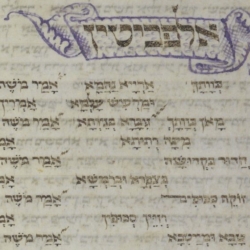Since the use of targum became a special rare occasion, Jews did what we do for special rare occasions — we write piyyutim. An extensive series of Aramaic piyyutim were written, to be inserted into the recitation of the targum (or the ‘seder meturgeman’) itself. On Shavuot, a massive series of piyyutim, one for every one of the ten commandments and then some, were written. On Pesaḥ, a similar number of piyyutim were composed for important moments.
Since the mass acceptance of the Shulḥan Arukh, the custom of the recitation of the targum on these special days has been lost from Ashkenazi practice, and as a consequence the vast majority of the seder meturgeman piyyutim themselves have been abandoned. A small number of Shavuot seder meturgeman piyyutim are still in use (specifically, Aḳdamut Milin and Yetsiv Pitgam), but taken out of their original context. (As an example, why do we read Yetsiv Pitgam after the first verse of the haftarah? Because it’s meant to introduce the targum!)
I personally love Aramaic, piyyutim, and liturgy, so I’ve taken it upon myself to translate a selection of seder meturgeman piyyutim. This piyyut, Amar Oyev (The Enemy Said), the sixth in a series of Aramaic piyyutim from the seventh day of Pesaḥ, is meant to be recited as an introduction to the targum of Exodus 15, verse 9.
| Source (Armaic) | Source (English) |
|---|---|
אָמַ֥ר אוֹיֵ֛ב אֵסוֹר מֶרְכָּבָה בְּחַרְבָּא דְּלָא מִתְרַבְרְבָא גִּבָּרַיָּא עַבְדֵי קְרָבָא׃ |
The enemy said… Arrange my ride! By undefeatable sword, Come, mighty, to battle! |
אָמַ֥ר אוֹיֵ֛ב דְּחוּקוּ בָּתַר מְשׁוּעְבָּדַי הֲווֹן מָאתַיִן וְעַשֲׂר שְׁנִין תְחוֹת יְדַי וּמִן־בָּתַר־כֵּן עֲרַקוּ מִן־שִׁעְבּוּדַי׃ |
The enemy said… Dash after my slaves! Ere 210 years under my hand Fleeing from my servitude! |
אָמַ֥ר אוֹיֵ֛ב זְרוּזוּ בַּתְרֵיהוֹן וַאֲנָא עִימְּכוֹן הֵיךְ גִיבָּרָא חֲבִישִׁין אִנּוּן בְּאׇרְחָא וְלֵית לְהוֹן מַעְבְּרָא טְרָדְנָא עֲלֵיהוֹן יַמָּא וּמַדְבְּרָא׃ |
The enemy said… Go after them, I’ll heroically be with you! Hostage on the road, no way across! In both sea and desert we blocked them! |
אָמַ֥ר אוֹיֵ֛ב יִתְקוֹף חֵילִי עַל־חֵילְוָתְהוֹן כִּרְעוּתִי עֲבִידוּ בְּמַשִׁרְיָתְהוֹן לְמִפְלְגָא יַת־בִּזַתְהוֹן׃ |
The enemy said… Just my power can defeat theirs. Keep my orders to their camps. Let’s split the spoils! |
אָמַ֥ר אוֹיֵ֛ב מְלִיאוּ יְדֵיכוֹן מִנֵּהוֹן נְכִיסוּ יַת־אֱנַשֵׁיהוֹן סָאִיבוּ יַת־נָשֵּׁיהוֹן |
The enemy said… Make off with their stuff. Now kill their men! Or abuse their women! |
אָמַ֥ר אוֹיֵ֛ב עִבִידַת דָּמִין יִתְעַבֲדוּ פָּרְצוּפֵיהוֹן מִיתְחוֹת שְׁמַיָּא יֵאבַדוּ צְדִיַּית קַשְׁתִּי בִּפְרִיעַ יִצְדַדוּ |
The enemy said… Peformed the bloody work! Quiet them from under heaven, Release my bow, and they run! |
אָמַ֥ר אוֹיֵ֛ב קְטִילַת רַבָּא קְטִילוּ בְּהוֹן רַבְרְבָנַיי יְפַלְגוּן יַת־שְׁלַלְהוֹן שִׁיתוּ לְחַבָּלָה כׇּל־אַנְפֵּיהוֹן |
The enemy said… So kill them with much killing! To let my nobles split the spoils, Upend all their faces to doom! |
אָמַר מֹשֶׁה רֹ֘עֵ֤ה יִשְׂרָאֵ֨ל ׀ הַאֲזִ֗ינָה נֹהֵ֣ג כַּצֹּ֣אן יוֹסֵ֑ף יֹשֵׁ֖ב הַכְּרוּבִ֣ים הוֹפִֽיעָה׃ (תהלים פ:ב) |
Moses said… Verily, Shepherd of Israel, listen! Who leads Joseph like a flock! You enthroned on the cherubim, shine forth![1] Psalm 80:2, cited in Hebrew. |
Notes
| 1 | Psalm 80:2, cited in Hebrew. |
|---|

“אָמַר אוֹיֵב | Amar Oyev (The Enemy Said) — a piyyut for the Seder Meturgeman of the 7th Day of Pesaḥ” is shared through the Open Siddur Project with a Creative Commons Attribution-ShareAlike 4.0 International copyleft license.










Leave a Reply